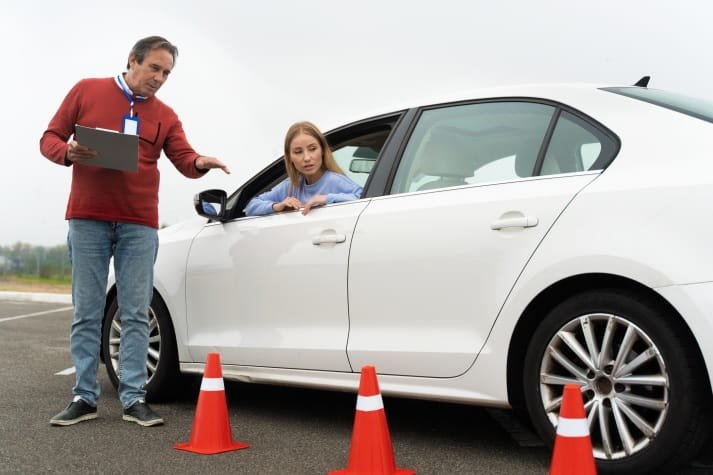Passing a driving test can be a nerve-wracking experience, and it’s easy to make unnecessary mistakes under pressure. To ensure a stress-free and successful test, thorough preparaƟon is essenƟal. The more you pracƟce, the beƩer your chances of passing. Here, we provide 28 Ɵps on what not to do on the big day to increase your chances of passing and reduce anxiety. This comprehensive guide offers a detailed overview of what to expect during your driving test. Before we delve into the details, it’s worth noƟng that the test goes by different names in various states, such as the driving test or the PracƟcal Driving Assessment (PDA) in Queensland and Western Australia. Throughout this guide, we’ll use both terms interchangeably.
So, how can you increase your chances of passing the test?
1. Rushing to Get Your License
It’s crucial to build confidence in your driving skills before attempting the test. Practice until you’re not just meeting the required hours but feeling comfortable behind the wheel. In addition to learning from your parents or guardians, consider professional lessons. Instructors can spot bad habits and provide objective feedback, improving your chances of passing.
2. Taking Your PDA in an Unfamiliar Area
While you won’t know the exact test route, you can prepare by taking mock driving tests in the area where your assessment will occur. Familiarity can significantly reduce nerves and boost your confidence.
3. Taking Your Driving Test at the Wrong Time
Avoid scheduling your test during peak road usage times, like morning and evening rush hours. These busy periods can add extra pressure, making your test more challenging.
4. Focusing on the Fail Rate
Avoid reading stories of others’ failures online, as this can increase anxiety and lead to mistakes. Go into your test with the knowledge gained from study and the skills developed through practice.
5. Not Knowing How Long the Driving Test Will Take
Knowing the test duration helps you visualize the experience and practice within the allocated time, providing a more accurate experience.
6. Forgetting to Practice Driving in Different Conditions
Your driving test will proceed, rain or shine. Practice in various weather conditions to prepare for slippery roads, heavy rain, and safe driving in adverse conditions.
7. Going over Theory Only Once
Review driving theory and laws multiple times until you feel confident with the material. Your test route may include less common road situations, so understanding how to react is vital.
8. Choosing Not to Take Driving Lessons
Professional lessons provide well-rounded driving experience, improving your chances of passing. Skills like parking and handling road hazards are easier to master with lessons.
9. Not Bringing Your Instructor With You to the Test
Having your instructor present allows for last-minute questions and concerns, reducing nerves and ensuring a clear mind before the assessment.
10. Not Using Your Instructor’s Car
If possible, use your instructor’s car for the test. It meets all test car standards, and your familiarity with it increases your chances of a stress-free experience and passing.
11. Not Getting Enough Rest Before the Test
Lack of sleep can affect your performance. Avoid late nights and alcohol to wake up refreshed and alert on test day.
12. Coming to the PDA Without a Fully Licensed Driver
Bring a fully licensed driver with you to ensure a safe journey home. New drivers can be vulnerable to post-assessment adrenaline, so having an experienced driver is wise.
13. Forgetting the Required Documents
Bring all necessary documentation, including ID, license application form, and logbook, to the test center.
14. Using an Unsuitable Car for the Test
Ensure your car is roadworthy, as it will undergo an inspection before the test. Consult your local authority’s roadworthy standards to avoid rescheduling.
15. Underestimating the PDA
Maintaining concentration throughout the test is essential; lack of focus can lead to failure.
16. Being Overly Nervous
Excessive anxiety can lead to mistakes. Stay as relaxed as possible, reminding yourself of your preparation.
17. Being Unfamiliar With the Driving Test
Procedures and Policies Review all stages, policies, and procedures with your instructor to know what to expect during your test.
18. Forgetting to Fasten Your Seatbelt and Adjust Seats and Mirrors
Failure to wear your seatbelt results in an automatic fail. Properly adjust mirrors and seats for clear visibility and the correct driving position, crucial for your test.
19. Improperly Signaling
Signal for at least 5 seconds before moving, neither too early nor too late. Avoid leaving your indicator on.
20. Failing to Check Blind Spots and Forgetting Shoulder Checks
Check blind spots when merging, changing lanes, or parking. Understanding your blind spots is crucial for safety. Creeping Forward or Rolling Through Stop Signs Ensure your car comes to a complete stop before the stop line at stop signs or traffic lights. Avoid rolling through, even if your view is obscured by parked cars.
21.Misjudging Gaps in Traffic
Accurately judging the speed of oncoming traffic when pulling away from the curb or exiting a parking lot is crucial. Confidence in this skill comes with practice, so keep practicing until you’re confident, not just until you meet the required hours.
22.Hesitating or Being Indecisive When Turning Right
Hesitation when turning right at intersections can affect your test outcome. Maintain a reasonable gap from the car in front and make timely, safe right turns. Be decisive and confident in your choices.
23.Infrequently Checking Mirrors
Testing officers closely observe your mirror usage. Regularly check your mirrors to ensure proper mirror checks, a vital component of the practical driving test.
24.Not Asking Your Examiner to Repeat Themselves
Don’t hesitate to ask your examiner to repeat instructions if needed. Failure to understand instructions can negatively impact your test score.
25.Assuming You Failed
Avoid assuming you’ve failed, even after making a mistake. Continue the test confidently unless the examiner stops it.
26.Assuming You Have Room for Error
While some errors are less critical than others, don’t assume you can make multiple mistakes and still pass. Strive for a flawless performance.
27.Fail to Listen at the End
Pay close attention to the examiner’s final comments. They’ll provide valuable feedback to help you improve your skills.
Now that you know what to avoid during your driving assessment, remember that there are numerous online resources for learning to drive. Maintaining a calm and focused mentality during your assessment is crucial, so concentrate on the road and your driving. Good luck on your driving test!





A WordPress Commenter
Hi, this is a comment.
To get started with moderating, editing, and deleting comments, please visit the Comments screen in the dashboard.
Commenter avatars come from Gravatar.